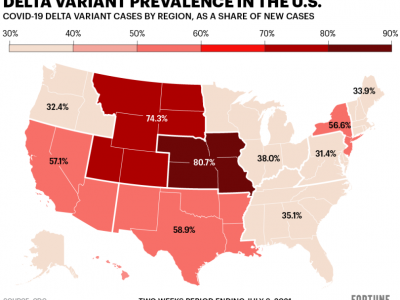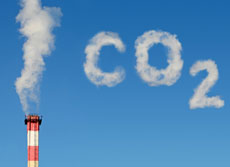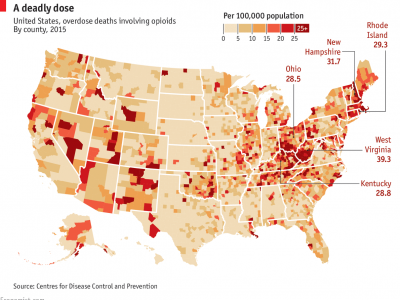The Delta Variant
Here’s what we can (probably) expect.
The Delta Variant sounds like the title of one of those Robert Ludlum thrillers, like The Bourne Identity. Actually, though, it's a lot scarier. The Delta variant of the coronavirus is rapidly becoming dominant. What are its characteristics and what can we expect from its spread? The first thing to know is that the Delta variant is about 50% more transmissible than the Alpha variant, which itself is more transmissible than the original COVID strain. This increase ...
CONTINUE READINGMajor International Climate Developments
China and the EU took important steps forward this week.
This week has seen some big climate moves on opposite sides of the world. The EU has proposed a major new climate plan. Meanwhile, China is ready to go live with its emissions trading system. The U.S. is at risk of being left behind. The EU’s proposal is impressive. The goal is to cut net greenhouse gas emissions by 55% from 1990 levels by 2030. It would essentially ban the sale of new gas-powered cars by 2035. It would also phase out coal and impose a tax on avia...
CONTINUE READINGGuest Contributor Kate Mackintosh: 200 Words to Save the Planet—The Crime of Ecocide
Could ecocide become the fifth crime to be prosecuted at the International Criminal Court?
Last month, a panel of international lawyers chaired by Philippe Sands and Dior Fall Sow launched our proposal for a new crime of ‘ecocide’ – an international crime of environmental destruction that would sit alongside genocide, crimes against humanity, war crimes and the crime of aggression at the International Criminal Court. The idea of ecocide dates back to the 1970s and the Vietnam War, but the acceleration of the climate crisis has given it new impetus...
CONTINUE READINGEarth System Interventions for Sustainability
We actively shape major Earth systems, with increasingly powerful technologies. We should face up to it.
Stewart Brand--a contender for the most interesting living person in the world--famously opened the Whole Earth Catalogue in 1969, “We are as gods and might as well get good at it.” Importantly (and often misunderstood), he meant not that we are gods, but instead that technologies have given humanity powers that had previously been exclusive to the gods. Given this, being good at it would be better than being bad or merely blindly moving forward. Of course, what "b...
CONTINUE READINGVaccination, Enlightenment Values, and the Founders
Anti-vaxxers and climate deniers are abandoning America’s founding values.
Ironically, those who most trumpet their allegiance to the Founders often have least in common with their values. The Founding Fathers were men of the Enlightenment. They shared a belief that reason, free inquiry, and science would better the human condition. They looked to reason as a guide. They sought, in Jefferson's words, to expunge "every form of tyranny over the mind of man." Medicine was one area where the Enlightenment saw the potential for reason and sc...
CONTINUE READINGThe Opioid Epidemic and Vaccine Hesitancy
The places hit hardest by opioids are often skeptical of vaccines. That’s probably not a coincidence.
The opioid crisis was the product of corporate greed run amok and a corrupted regulatory process. That crisis may have amplified deep distrust of the pharmaceutical industry and its government watchdogs — distrust that may now be reflected in vaccine skepticism. First, a little history. The manufacturer, Purdue Pharma, aggressively promoted the use of oxycontin, courting doctors with promotional material and assiduously pushing individual doctors to make ever-more...
CONTINUE READINGThe Northwest Extreme Heat Wave Is a Call to Policy Action
Extreme heat in the Pacific Northwest over the past few weeks shattered records - 108º in Seattle, 116º in Portland, 121º in Lytton, BC, the day before a wildfire devastated the town - and has been linked to hundreds of deaths, a number that will surely increase as local officials gather more information. It has melted streetcar infrastructure, buckled roads, and threatened crops. It is an unmistakable climate change disaster, and unsurprisingly it is disproportionate...
CONTINUE READINGJefferson’s Bridge
Anticipating modern environmental views, Jefferson viewed nature as a public trust.
Today being the Fourth of July, it seems appropriate to think about how the author of the Declaration of Independence felt about nature. A revealing example involves some land Jefferson owned between Lexington and Roanoke, which he sought to preserve. Two years before the Declaration of Independence, Jefferson purchased 157 acres of land from the King. He bought the land because it contained a remarkable feature -- a 200-foot natural bridge carved out of the rock ...
CONTINUE READINGThe Illusions of Takings Law
Nothing is as it seems, when the issue is whether a regulation is a “taking” of property.
For the last century, the Supreme Court has tried to operationalize the idea that a government regulation can be so burdensome that it amounts to a seizure of property. In the process, it has created a house of mirrors, a maze in which nothing is as it seems. Rules that appear crisp and clear turn out to be mushy and murky. Judicial rulings that seem to expand the rights of property owners turn out to undermine those rights. The Court’s decision last week in Cedar Poin...
CONTINUE READINGCalculating the Extinction Cost of Carbon
Or, how many megatons do we need to cut to prevent one extinction?
Economists often talk about the social cost of carbon, which basically translates the harm done by a ton of CO2 into dollars. The dollar metric is less useful as applied to ecological impacts like species extinctions than impacts of humans. It may be better to skip the dollar conversion, and just ask how much a ton of CO2 raises the likelihood of an additional species going to extinct. In short, what’s the extinction cost of carbon? There are uncertainties in ...
CONTINUE READING












